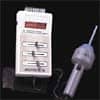October 19, 2007
WASHINGTON, DC —Senators Charles Grassley (R-Iowa) and Herb Kohl (D-Wis) have announced their intention to introduce legislation that would regulate nearly all gifts that drug and medical device manufactures provide to health care professionals. While introduction is pending in the Senate, a near identical piece of legislation has been introduced in the House Rep Peter DeFazio (D-Ore).
Referred to as the Drug and Medical Device Company Gift Disclosure Act (HR 3023), the legislation calls for the disclosure of any gift a drug or device manufacturer, packer, or distributor provides to a health care professional. The legislation defines “gift” broadly to include any fee, payment, subsidy, amenity, object, service, or any other economic benefit totaling more than $50 per year. Exceptions would include free samples for patients’ use, clinical trial compensation, and scholarships or aid for medical students and fellows.
“Right now the public has no way to know whether a doctor’s been given money that might affect prescribing habits,” Grassley says. “This bill is about letting the sun shine in so that the public can know. Whether it’s dinner at a restaurant or tens of thousands of dollars or more in fees and travel, patients shouldn’t be in the dark about whether their doctors are getting money from drug and device makers.”
“At our June hearing, the pharmaceutical industry told the Aging Committee that they believe their practices are above-board. If that is the case, full disclosure will only serve to prove them right. If that is not the case, full disclosure will bring their influence-peddling out from the shadows. Either way, patients win,” Kohl says.
Senators Claire McCaskill (D-Mo), Chuck Schumer (D-NY), Amy Klobuchar (D-Minn) and Ted Kennedy (D-Mass) are original co-sponsors of the Grassley-Kohl.
The newly proposed federal legislation reportedly builds on similar initiatives in Minnesota, Vermont, Maine, and West Virginia. The Physician Payments Sunshine Act would apply to manufacturers with $100 million or more in annual gross revenues. Penalties for not reporting payments would range from $10,000 to $100,000 per violation. The legislation would require that the Secretary of Health and Human Services create a Web site and post payment information in a clear and understandable manner.
Grassley is ranking member of the Committee on Finance, where he has conducted oversight of educational grants awarded to doctors by drug companies. Kohl is chairman of the Special Committee on Aging. He conducted a hearing in June to examine the financial relationship between physicians and the pharmaceutical industry.
To see the floor statements by Gressley and Kohl, click here.



